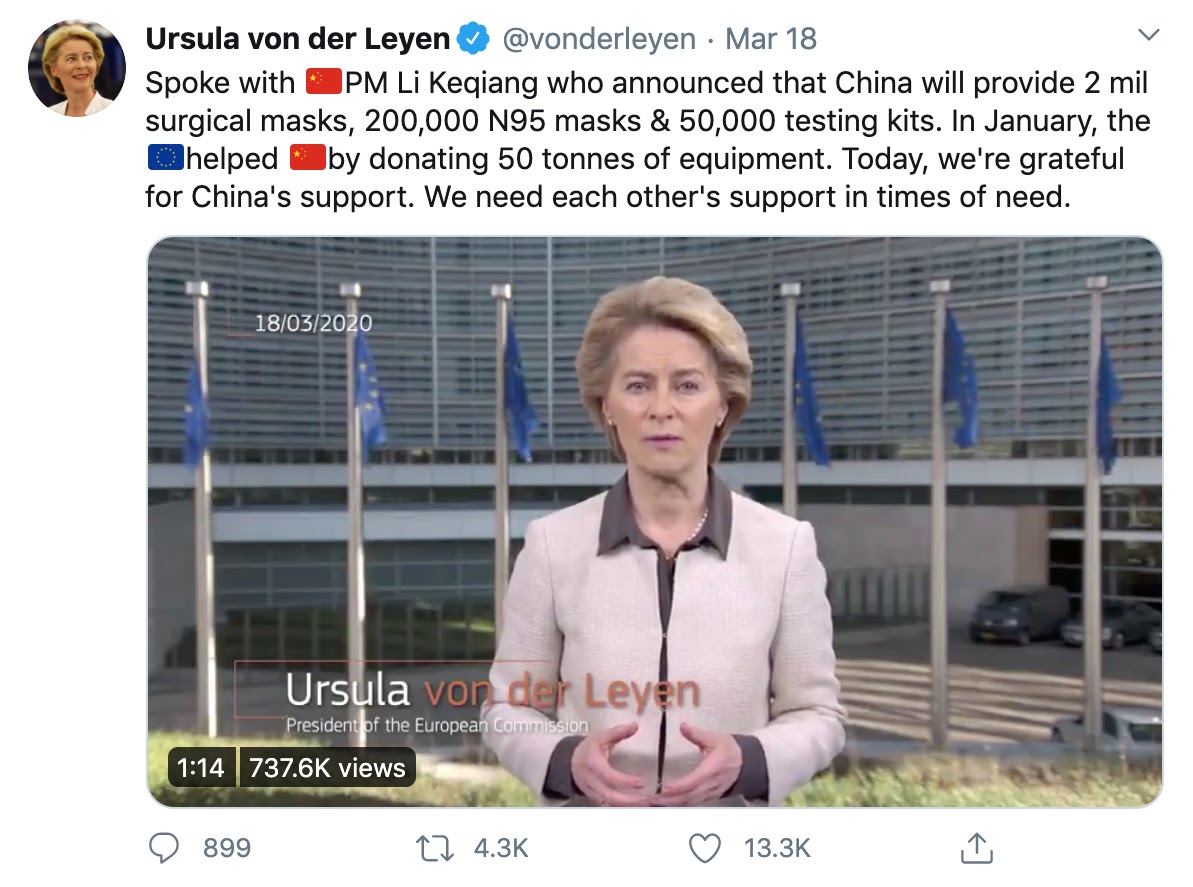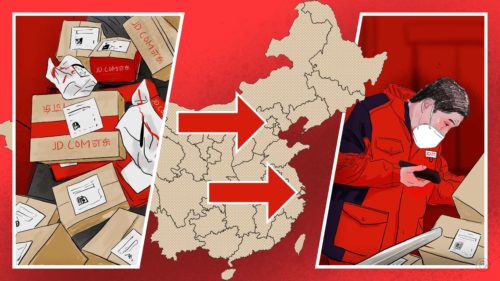Europe stuck in uncomfortable middle between ‘America first’ and China’s ‘mask diplomacy’
German news magazine Der Spiegel reported that the G7 countries — the U.S., Canada, France, Germany, Italy, Japan, and the United Kingdom — haven’t been able to agree on a joint statement about COVID-19 because of U.S. Secretary of State Mike Pompeo’s insistence that the statement use the term “Wuhan virus.”

Photo credit: A tweet from the President of the European Commission, which was featured in a People’s Daily article titled, Foreign politicians thank China for support amid epidemic.
German news magazine Der Spiegel today reports (in German) that the G7 countries — the U.S., Canada, France, Germany, Italy, Japan, and the United Kingdom — haven’t been able to agree on a joint statement about COVID-19 because of Secretary of State Mike Pompeo’s insistence that the statement use the term “Wuhan virus.”
Der Spiegel interprets this as Pompeo representing Trump’s “line” that the “Chinese are to blame, Europe reacted too late and helped bring the virus to the U.S.,” citing the way that Trump announced a European travel ban without consulting any European allies.
That may be true, but Trump has recently backed off calling COVID-19 the “Chinese Virus,” as we noted yesterday. That appears to not have yet changed the official line of American bureaucracy: The Daily Beast reported on March 21 that a government cable, apparently from the National Security Council, pushed State Department officials to emphasize a Chinese “cover-up.”
Many in Europe are uneasy about “mask diplomacy”
With the U.S. pushing its “America first” line, and with Italy and Spain both having death tolls from COVID-19 that surpass the official total in China, one might expect that European leaders are welcoming China’s donations of masks and medical supplies with open arms. That is certainly true some of the time.
However, some European leaders see China’s actions through a political lens. The SCMP reports:
The European Union’s top diplomat has fired a warning shot at China’s “politics of generosity,” amid a growing sense of unease over Beijing’s targeted strategy to help certain European countries with medical supplies…
In an unusual choice of language, the bloc’s foreign policy chief Josep Borrell called on EU countries to stand ready for a “struggle for influence” in a “global battle of narratives.”
The sense of unease may go beyond EU officials: Though Twitter is hardly representative of the general public, SCMP correspondent Stuart Lau last week observed some reactions in France to a post from the Chinese ambassador there:
China’s mask diplomacy isn’t going down well in France. While some thank China, others leave comments and ask (1) why China covered up outbreak at the start, (2) whether this amount is bigger/smaller than what France sent China, (3) why France should say merci to virus’ origin.
The Nikkei Asian Review adds that not too long ago, the Twitter account of the Chinese Embassy in Paris had been amplifying the conspiracy theories of Zhao Lijian, and notes two other controversies:
On Sunday, Swedish Defense Minister Peter Hultqvist warned publicly that Chinese and Russian media were engaged in a disinformation campaign to tarnish his own country’s handling of the crisis. China had reportedly blasted Stockholm’s response as a “capitulation” to the virus…
…[scholar Andrew Small says that] now there is a perception — right or wrong — that Chinese officials and businesses are using the crisis to gain leverage.
A case in point is Huawei’s reported donation of 800,000 face masks to the Netherlands last week. Analysts have questioned whether this was motivated by altruism or by the 5G telecom auction scheduled to take place in Amsterdam in June. Dutch authorities have yet to decide whether to side with the U.S. and other European states in banning Huawei from developing 5G infrastructure over espionage concerns.
—Lucas Niewenhuis, with help from Jonathan Michel






